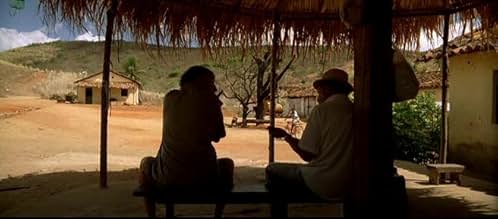IMDb-BEWERTUNG
6,2/10
1382
IHRE BEWERTUNG
Füge eine Handlung in deiner Sprache hinzuA man gets obsessed by a teenage girl, who is exploited by her own grandfather, who sometimes takes her to a gas station to show her naked to whomever pays him some money.A man gets obsessed by a teenage girl, who is exploited by her own grandfather, who sometimes takes her to a gas station to show her naked to whomever pays him some money.A man gets obsessed by a teenage girl, who is exploited by her own grandfather, who sometimes takes her to a gas station to show her naked to whomever pays him some money.
- Regie
- Drehbuch
- Hauptbesetzung
- Auszeichnungen
- 11 Gewinne & 12 Nominierungen insgesamt
Marcélia Cartaxo
- Ceiça
- (as Marcelia Cartaxo)
Hermila Guedes
- Dora
- (as Hermylla Guedes)
Cláudio Assis
- Man caressing Auxiliadora
- (Nicht genannt)
Empfohlene Bewertungen
"Baixio das Bestas" (2006) is not framed as conventional entertainment, but rather as a profound reflection on the social tragedies that afflict the interior of Brazil, problems that have perpetuated over the years and still persist in several regions.
The promising cast delivers powerful and convincing performances, elevating the film's immersion and emotionally impacting viewers. The plot is disturbing and uncomfortable, reflecting director Cláudio Assis' clear intention to provoke discomfort and reflection. In just a few minutes, the plot addresses critical social issues, such as the sexual exploitation of young women, physical and psychological violence, poverty, social marginalization and impunity, developing these themes with depth and sensitivity. However, the film opts for a more fragmented narrative, composed of melancholic and depressing scenes, abandoning a cohesive structure in favor of a raw and visceral exposition of Brazilian reality.
"Baixio das Bestas" is not an easy-to-digest film, but its intention is precisely to shock and awaken the public to a tangle of social criticism. For those who understand the context and objectives of the work, it proves to be a profound and necessary experience.
The promising cast delivers powerful and convincing performances, elevating the film's immersion and emotionally impacting viewers. The plot is disturbing and uncomfortable, reflecting director Cláudio Assis' clear intention to provoke discomfort and reflection. In just a few minutes, the plot addresses critical social issues, such as the sexual exploitation of young women, physical and psychological violence, poverty, social marginalization and impunity, developing these themes with depth and sensitivity. However, the film opts for a more fragmented narrative, composed of melancholic and depressing scenes, abandoning a cohesive structure in favor of a raw and visceral exposition of Brazilian reality.
"Baixio das Bestas" is not an easy-to-digest film, but its intention is precisely to shock and awaken the public to a tangle of social criticism. For those who understand the context and objectives of the work, it proves to be a profound and necessary experience.
There is a fire in this movie. A fire that burns down the sugarcane crops that the locals are harvesting. That fire should have burnt down everybody and everything involved in this travesty.
Fire cleanses.
Fire cleanses.
In a small village in the hinterland of Pernambuco (Northeast Brazil), amoral old scrooge Heitor rants about everything and abuses his virgin (technically, at least) 15 year-old granddaughter Auxiliadora (Mariah Teixeira) in every possible way: when she's finished with her daily slave-like house chores, he takes her to a filthy joint and forces her to expose her naked body for a queue of men who pay the old ogre to feel and grope her young flesh. Among these men is Cícero (Caio Blat), an "agroboy" (a Brazilian expression defining young upper- class playboys, jackass-style, in the rural areas) who, in the lulls between violent orgies, beating prostitutes, running over peasants with his car, treating his mother like dung and indulging himself in large quantities of booze and drugs, finds the time to become obsessed with destroying the old man by raping Auxiliadora.
Polemicist director Cláudio Assis seems to follow his controversial film debut "Mango Yellow" with a regional Brazilian version of "A Clockwork Orange". Determined to elbow his way into Brazilian cinema through shocking power, he drowns in contradictions by portraying (like Kubrick did in what's perhaps his most ideologically repugnant film) appalling moral and sexual violence through stylized, almost glamorized aestheticism. With the expert help of top Brazilian D.P. Walter Carvalho, Assis wants to make sure we acknowledge his talent and technique in every shot: he uses beautifully composed images, complex dolly shots, careful lighting and a soigné color palette mainly of yellows, oranges and greens (very tropical) to show social and moral putrefaction. He wags his self-righteous, accusatory finger at his characters and at the audience: it's a massacre and everyone (except maybe himself) is beyond redemption. In Assis's films, life is rotten, people are filthy scumbags (the innocent ones are also doomed), and Dante's Inferno is a refreshing spa compared to Brazilian Northeast reality.
The film benefits immensely from Fernando Teixeira's scary performance as Heitor, with his wealth of rants in fascinating regional vernacular (which is quite untranslatable), as well as Mariah Teixeira's innocent, benumbed passivity that is somehow quite believable -- child prostitution by the initiative of the children's parents and relatives is a social plague of alarming tradition and proportions in North and Northeast Brazil (q.v. "Anjos do Sol").
Unfortunately, the non-stop exploitation on the screen transcends fiction: the orgy/abuse/rape/violence scenes are some of the most repellent, humiliating and disrespectful manipulations of established professional actors ever perpetrated by a filmmaker -- it's astonishing and revolting to see serious actors like Caio Blat, Dira Paes, Hermila Guedes, Berlin award-winner Marcélia Cartaxo and others disposed of like porn cattle (Mateus Nachtergaele's over-the-top wacko comes as no surprise: we all know by now he's into sado-masochist acting). Assis himself appears in a nauseous cameo, as a client caressing the body of the very young Auxiliadora as she becomes a road-side whore (nope, no salvation for her either).
"Baixio das Bestas" is difficult to dismiss as just an over-the-top, contradictory, sadistic film (which it is) by a manipulative, exhibitionist, attention-starving, talented filmmaker (which he is) -- it does expose the painful raw nerves of a regional social and political putrid tissue that most of us don't know about or don't want to be aware of: the exploitative, abusive, boozing, violent, almost-feudalistic macho culture that still thrives in many parts of rural Brazil. The trouble is that the oeuvre of Cláudio Assis (like Sergio Bianchi and his hopelessly pessimistic films, like "Cronicamente Inviável") feeds on dead-end concepts of Brazil as a putrid nation and of the human being either as an irredeemable, violent, corrupt beast or innocent flesh ready to be exploited and abused -- highly debatable concepts, to say the least, and not everyone's idea of a good, intelligent time at the movies. If our "mondo" is a "mondo cane", its stylization is an ideological contradiction that serves no other purpose than to make the twisted joy of sadists, masochists and depressed pessimists. Chacun son goût, I guess.
Polemicist director Cláudio Assis seems to follow his controversial film debut "Mango Yellow" with a regional Brazilian version of "A Clockwork Orange". Determined to elbow his way into Brazilian cinema through shocking power, he drowns in contradictions by portraying (like Kubrick did in what's perhaps his most ideologically repugnant film) appalling moral and sexual violence through stylized, almost glamorized aestheticism. With the expert help of top Brazilian D.P. Walter Carvalho, Assis wants to make sure we acknowledge his talent and technique in every shot: he uses beautifully composed images, complex dolly shots, careful lighting and a soigné color palette mainly of yellows, oranges and greens (very tropical) to show social and moral putrefaction. He wags his self-righteous, accusatory finger at his characters and at the audience: it's a massacre and everyone (except maybe himself) is beyond redemption. In Assis's films, life is rotten, people are filthy scumbags (the innocent ones are also doomed), and Dante's Inferno is a refreshing spa compared to Brazilian Northeast reality.
The film benefits immensely from Fernando Teixeira's scary performance as Heitor, with his wealth of rants in fascinating regional vernacular (which is quite untranslatable), as well as Mariah Teixeira's innocent, benumbed passivity that is somehow quite believable -- child prostitution by the initiative of the children's parents and relatives is a social plague of alarming tradition and proportions in North and Northeast Brazil (q.v. "Anjos do Sol").
Unfortunately, the non-stop exploitation on the screen transcends fiction: the orgy/abuse/rape/violence scenes are some of the most repellent, humiliating and disrespectful manipulations of established professional actors ever perpetrated by a filmmaker -- it's astonishing and revolting to see serious actors like Caio Blat, Dira Paes, Hermila Guedes, Berlin award-winner Marcélia Cartaxo and others disposed of like porn cattle (Mateus Nachtergaele's over-the-top wacko comes as no surprise: we all know by now he's into sado-masochist acting). Assis himself appears in a nauseous cameo, as a client caressing the body of the very young Auxiliadora as she becomes a road-side whore (nope, no salvation for her either).
"Baixio das Bestas" is difficult to dismiss as just an over-the-top, contradictory, sadistic film (which it is) by a manipulative, exhibitionist, attention-starving, talented filmmaker (which he is) -- it does expose the painful raw nerves of a regional social and political putrid tissue that most of us don't know about or don't want to be aware of: the exploitative, abusive, boozing, violent, almost-feudalistic macho culture that still thrives in many parts of rural Brazil. The trouble is that the oeuvre of Cláudio Assis (like Sergio Bianchi and his hopelessly pessimistic films, like "Cronicamente Inviável") feeds on dead-end concepts of Brazil as a putrid nation and of the human being either as an irredeemable, violent, corrupt beast or innocent flesh ready to be exploited and abused -- highly debatable concepts, to say the least, and not everyone's idea of a good, intelligent time at the movies. If our "mondo" is a "mondo cane", its stylization is an ideological contradiction that serves no other purpose than to make the twisted joy of sadists, masochists and depressed pessimists. Chacun son goût, I guess.
Bog of Beasts revolves around a greedy, narrow-minded Grandfather who uses his deceased daughter's child for money. Sure she does all the work around the house, but she's also forced into stripping her clothes off and standing nude in front of horny, perverted men. With another sub-plot revolving around Brazilian playboys (spoiled rich kids) who do nothing but drink, do drugs and bang whores, the story gives us a very intimate view into Brazil's prostitution circuit and the people who are intertwined within it.
The production values are fantastic. With stunningly gorgeous shots of the more tropical and rural parts of Brazil, the cinematography really works well. It's funny how they change it up from sleazy parties with lewd acts to beautiful backdrops with rivers and palm trees. The acting is pretty much perfect as well. With the pervert Grandpa having a great performance and our pal, Carrot, from City of God is again show-casing his great acting skills.
The movie's production values and acting is all fantastic stuff, but the story was somewhat of a let-down, and pretty predictable. The movie does have some explicit scenes involving child molestation and rape but it's nothing so crazy it will ruin the movie. The scenes are all realistic, which is also a good thing, but the story itself, just felt very familiar. And it didn't really go anywhere. By the middle of the flick, I had a very good idea where it'd be heading, and I wasn't wrong. Not to say the story was told poorly, but it just didn't do much for me. Though, I am curious to how much prostitution and child prostitution with assistance from family members is abound in Brazil. Obviously, it takes place all over the world, but I'm assuming in Brazil (because of this movie) it may be a little worse that most.
Nevertheless, the movie works the majority of the time, and I enjoyed all actors. One minor problem, why were they calling that incredibly gorgeous woman a "vulture"? That was some bad casting right there. She's most likely some type of super model....oh well. It was nice seeing her naked briefly though. Bog of Beasts is a somewhat tedious flick, with a strong message behind it. If you're into serious drama, then I'd recommend you give it a look.
The production values are fantastic. With stunningly gorgeous shots of the more tropical and rural parts of Brazil, the cinematography really works well. It's funny how they change it up from sleazy parties with lewd acts to beautiful backdrops with rivers and palm trees. The acting is pretty much perfect as well. With the pervert Grandpa having a great performance and our pal, Carrot, from City of God is again show-casing his great acting skills.
The movie's production values and acting is all fantastic stuff, but the story was somewhat of a let-down, and pretty predictable. The movie does have some explicit scenes involving child molestation and rape but it's nothing so crazy it will ruin the movie. The scenes are all realistic, which is also a good thing, but the story itself, just felt very familiar. And it didn't really go anywhere. By the middle of the flick, I had a very good idea where it'd be heading, and I wasn't wrong. Not to say the story was told poorly, but it just didn't do much for me. Though, I am curious to how much prostitution and child prostitution with assistance from family members is abound in Brazil. Obviously, it takes place all over the world, but I'm assuming in Brazil (because of this movie) it may be a little worse that most.
Nevertheless, the movie works the majority of the time, and I enjoyed all actors. One minor problem, why were they calling that incredibly gorgeous woman a "vulture"? That was some bad casting right there. She's most likely some type of super model....oh well. It was nice seeing her naked briefly though. Bog of Beasts is a somewhat tedious flick, with a strong message behind it. If you're into serious drama, then I'd recommend you give it a look.
I'm Brazilian and I have to say that lately I've been really impressed by our local production... And "Baixio das Bestas" is one of those films that stuck in my mind for a while and I decided to write this review... Before watching it, i was already preparing myself for some kind of a shocking film, since its director is the excellent Cláudio Assis, a very raw person who speaks (and shoots) what he really feels is the true reality of our country. The cast of "Baixio das Bestas" hands out incredible performances, the characters are deep and violent. And before anyone says they're too brutal or something like, it must be considered that they are depicting the reality of Brazilian countryside, based on conservative and traditional rules. The film is great, superb cinematography and directing.
Baixio das Bestas, 8/10
Baixio das Bestas, 8/10
Top-Auswahl
Melde dich zum Bewerten an und greife auf die Watchlist für personalisierte Empfehlungen zu.
- How long is Bog of Beasts?Powered by Alexa
Details
- Erscheinungsdatum
- Herkunftsland
- Sprache
- Auch bekannt als
- Bog of Beasts
- Drehorte
- Produktionsfirmen
- Weitere beteiligte Unternehmen bei IMDbPro anzeigen
Box Office
- Weltweiter Bruttoertrag
- 202.099 $
- Laufzeit1 Stunde 20 Minuten
- Farbe
- Sound-Mix
- Seitenverhältnis
- 2.35 : 1
Zu dieser Seite beitragen
Bearbeitung vorschlagen oder fehlenden Inhalt hinzufügen

Oberste Lücke
By what name was Sumpf der Bestien (2006) officially released in Canada in English?
Antwort























